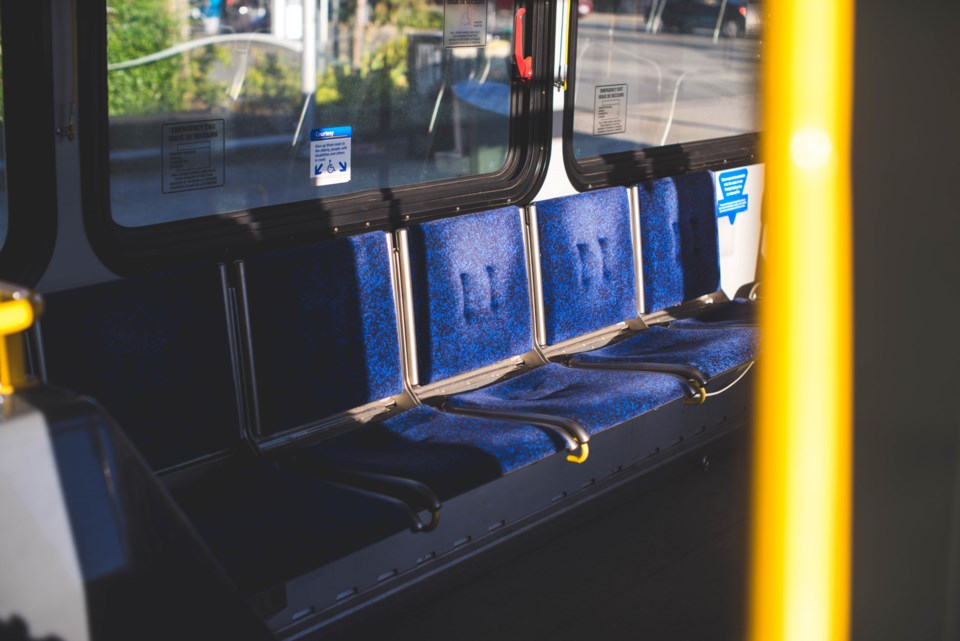The Resort Municipality of Whistler (RMOW) has a long history of offering fare-free public transit options to locals and visitors, but could there be a future in which no one would ever have to pay to ride a bus in Whistler?
That’s the question that was posed to Whistler council during its regular meeting on Tuesday, July 20, when Mayor and councillors heard a presentation from RMOW transportation demand coordinator Emma DalSanto that laid out what fare-free transit would look like in the resort.
The answer? Maybe—if the RMOW can find a few extra million dollars, secure 17 more buses and fund approximately 23,000 more service hours for local transit.
Currently, Whistler’s transit system costs the RMOW about $7.3 million. About $3 million of that is paid for by revenue collected from transit fares.
Year-round fare-free transit would see the RMOW lose that revenue, while the municipality’s share of operational costs would rise along with the demand for public transit. The estimated additional cost to the RMOW to make the Whistler Transit System entirely fare-free, all 365 days of the year, would be approximately $5.25 million. That’s equivalent to nearly a 30 per cent hike in property tax rates, RMOW director of finance Carlee Price pointed out during the meeting.
The figures were determined by BC Transit, after the RMOW’s Transit Management Advisory Committee asked the organization to look into how the resort’s current fare-free transit initiatives could be expanded.
BC Transit’s report outlined the costs of four scenarios on expanding fare-free transit in Whistler: winter weekends, weekends year-round, spring/summer/fall, or daily. (Whistler Transit is already free to ride during summer weekends.)
It found that that introducing fare-free service in the winter would require more buses at peak times when the Gondola Transit Exchange is already tapped out at its maximum capacity. To that end, BC Transit recommended that any further expansion of fare-free transit in Whistler be focused on the spring, summer and fall seasons, until the Gondola Transit Exchange area can be expanded.
Councillors debated the pros and cons of a massive step like fare-free transit after hearing the report. Ultimately, councillors agreed that incremental changes are the way to go as Whistler works to reduce its overall emissions—especially those stemming from single-occupant vehicles.
“When I look at our big moves—our climate goals—we don’t have a lot of sharp spheres left in our quiver to reach our targets,” said Councillor Arthur De Jong. “This is one of them. And obviously a 30 per cent increase in property taxes—we’re not there, but if we can do it incrementally, maybe over a decade, we’ll get to where we need to be.”
Whistler Mayor Jack Crompton said looking at the idea only through the lens of property tax rises misses the fact that there are many different ways to fund transit.
“My hope is that this is far from the end of the work that our team does on analyzing and understanding how we can pay for significant growth in our transit system, and continue that legacy of fare-free transit,” he said, adding that he feels optimistic about the prospect of an additional “$5-million-a-year-worth of people” choosing Whistler’s transit system over private vehicles.
“That would change the way people get around our town,” he said.
The analysis comes on the heels of the province’s decision to eliminate transit fares for all British Columbians aged 12 and under, as of Sept. 1. Whistler is set to receive a monthly contribution from the provincial government of just over $9,000 to offset the cost.
No additional service hours will be added to Whistler’s transit system when B.C.’s new “kids-ride-for-free” program comes into effect, as the new provincial initiative will replace Whistler’s Family Travel Program. In place since 2013, that program made Whistler Transit complimentary for up to three children with the purchase of one adult fare.
Transit has also been free for high-school students in Whistler since early 2020, when a pilot project funded by an increase in the price of monthly parking passes for Day Lots 1 to 3 first launched.





